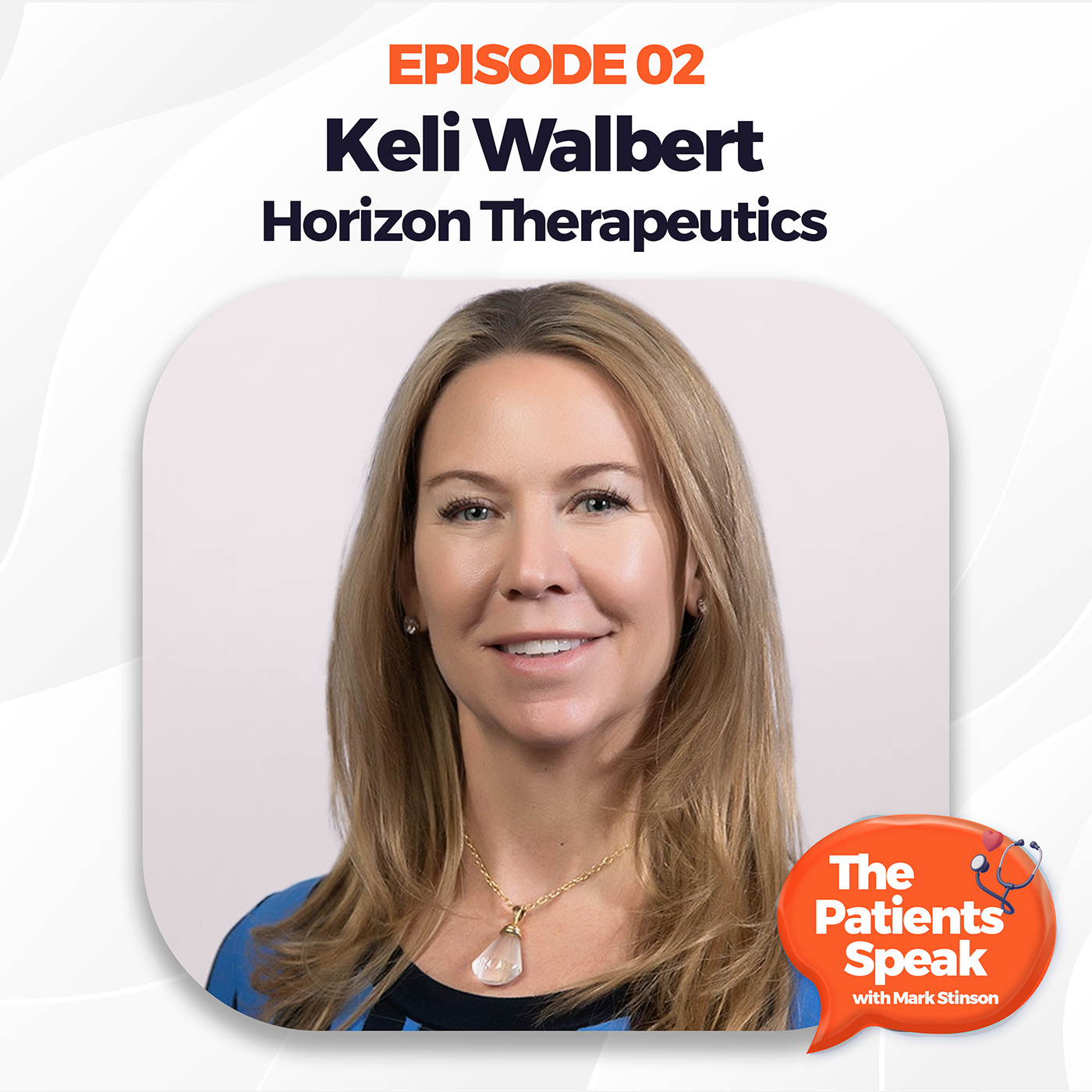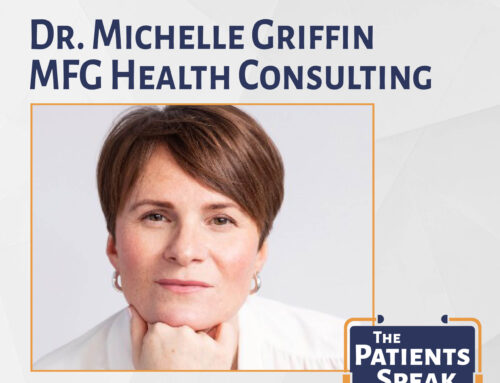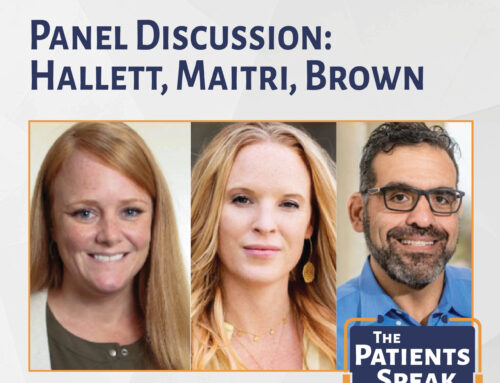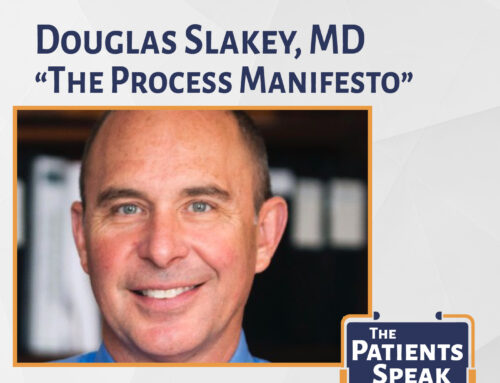Welcome friends to our new podcast, The Patients Speak. As we have conversations with innovative healthcare executives about what they learn when they hear the patients speak. Today’s topic is about listening while commercializing new therapies. There is market research, there is strategy, there are marketing programs, and there are opportunities to listen and learn all through that process.
Today’s guest is an expert in this field. Keli Walbert. She is Executive Vice President of Horizon Therapeuticsshe has also been selected as a Woman of Distinction by Medical Marketing + Media.
Mark Stinson (host):
Today’s guest, Keli Walbert, Executive Vice President of Horizon Therapeutics.
Keli Walbert (guest):
When thinking about disease states and when thinking about patients, pull back and look really broadly. Well beyond just the disease state, but across the lifestyle and across the life impact that a disease may have. At the grocery store, at the baseball game, with your kids sports, what does that really mean in their life? Because that’s where we can find real innovations that can make a difference for our patients, not only with the medicines that we’re providing them.
Mark Stinson (host):
Welcome friends to our new podcast, The Patients Speak. And if you’re one of our early listeners, we appreciate you coming by to the show and hope you’ll subscribe and follow our podcast as we continue conversations with innovative healthcare executives about what they learn when they hear the patients speak. Today’s topic, we’re going to talk about listening while commercializing new therapies. You know, there’s market research, there’s strategy, there’s marketing programs, and there’s opportunities to listen and learn all through that process. And there’s no better expert to hear that from than today’s guest, Keli Walbert, Executive Vice President of Horizon Therapeutics.
Keli Walbert (guest):
Thank you. I’m so happy to be here.
Mark Stinson (host):
We’re so glad to listen and learn from you, a commercial leader, a marketing strategist. And by the way, congratulations, you’ve been selected as a Woman of Distinction by Medical Marketing + Media. Congrats.
Keli Walbert (guest):
Thank you very much. I’m extremely honored to be recognized as such.
Mark Stinson (host):
And it’s quite a group. But I think you’ve earned your place in that, having worked in consumer marketing, healthcare marketing, your whole career practically. What do you think we can learn from the patients themselves?
Keli Walbert (guest):
Probably one of the first things that I like to think about is to remember that I don’t think of patients first as patients. I think of them as people and consumers. Because I think that it’s important that we look kind of across their lives to understand their experience. when we think of them as patients only, we can actually start our focus a little bit too narrowly, and we miss out on opportunities to see ways that we may be able to bring programs and offers to them that can help them more broadly than just their disease state.
Mark Stinson (host):
Well, and at Horizon you’ve worked in a wide range of therapeutic areas. I mean, the list is quite long, from rare to maybe more common. But is there a common foundation, a common approach that you take to listening to the patients?
Keli Walbert (guest):
The first thing that I would offer is that what all of our disease states have in common, even though, for example, gout is a more common disease state than cystinosis as an example. But we still focus on a portion of the gout market. And what our therapeutic areas have in common is that they are all relatively rare. And the reason that’s important is that rare disease patients often feel invisible because there’s not broad focus on their disease state. It’s not something that’s commonly known. It’s not something that’s commonly understood.
And I think that that provides us an opportunity to actually serve those patient communities by bringing some awareness to the diseases and even to the ways it affects their life. So the things that we do are probably not too significantly different from what you might find in a larger disease state. But we do ethnographic research, ethnographies, where we go into people’s home. We go with them kind of through their disease journey so that we really understand more holistically how their life is affected by the disease that they have so that we can also then identify ways that we can bring solutions that help them beyond just the medicine.
Mark Stinson (host):
And that ethnography and tying into what you said about patients as people first, but we often think the disease is their whole life sometimes, but they have a life outside of whatever they’re dealing with and doctor’s appointments and pill bottles, don’t they?
Keli Walbert (guest):
They do. And I actually think that that’s really important for us to recognize as marketers and as people that are developing solutions. The customer experience, the patient experience, has changed really dramatically, particularly in the past 10 years with digital engagement. And what’s happened now is that we are sending far more sophisticated and knowledgeable patients in to see doctors to seek solutions for their conditions. I think that’s good for the patients. I think that’s good for the doctors. I think that’s good for the healthcare system. But it’s important for us to provide those resources and then also understand that the journey’s a little bit different because of what they do have available to them digitally.
Mark Stinson (host):
Very good. Well Keli, maybe we could drill down on one of those many conditions that Horizon is offering solutions to. Give us an example maybe of a category and a patient type or program that you’re offering.
Keli Walbert (guest):
So one of the exciting products that we recently brought to market is called Tepezza and it’s for thyroid eye disease. The reason that we’re excited about this is Tepezza is a first in class novel monoclonal antibody that is treating thyroid eye disease. And it’s the first and only approved FDA therapy for thyroid eye disease. A couple of things that have been important in that journey. The first is that this was a compound that was being investigated in oncology. And there were many companies looking at IGF1R and its significance in oncology and as a potential candidate for certain cancers. It failed most of those studies and most of those trials. So the compound was actually shelved and a lot of companies just walked away. But there was a particular endocrinologist who continued to look at IGF1R and thought that there was some application in this thyroid eye disease.
And what he found was pretty significant. And he found that IGF1R is overexpressed in the eyes of people that suffer from thyroid eye disease. And that’s closely associated with Graves disease. So we had the opportunity to acquire the compound and continue through phase three trials, phase three development, and then bring it to market. One of the ways that we brought it to market that may be a little unique is that historically in all of the research before in looking into this, said that the patients treat this disease with endocrinologists. And all of the patients are in endocrinology. And in fact, they are all in endocrinology. Because the disease manifests most commonly in people with Graves disease who generally see an endocrinologist to treat their Graves disease.
However, once we started looking at the patient experience, and once we started doing our ethnographies and talking with patients, we learned that the physicians that they were seeing didn’t necessarily fully appreciate the symptoms and the impact that this disease was having on their quality of life. So we started talking to ophthalmologists who have a much better understanding of the eye, diseases of the eye, how to treat the eye and the impact on the quality of life that diseases can have. So what we did when we brought this product to market was we actually changed the point at which we believe treatment should occur. And we’re urging patients and actually endocrinologists and primary care physicians to send any patient with Graves disease to see an ophthalmologist where they can get diagnosed appropriately and then treat it appropriately.
Mark Stinson (host):
I see what you’re saying. If you take the broader view of the total life of the person, you don’t just look at the specialty they’re being diagnosed and treated at that moment. You know, the theme of this podcast being accelerating the patient journey, how do you feel this changed the patient journey to a healthier condition?
Keli Walbert (guest):
Well, like I said, ophthalmologists really have a far greater appreciation for what the symptoms of this disease are and how they can impact the patient’s life. So for example, the American Thyroid Association says that thyroid eye disease causes vision loss in 4-6% of patients. One of the symptoms of thyroid eye disease is called diplopia. And diplopia is actually blurred vision. About 60% of patients with thyroid eye disease suffer from diplopia. It means they can’t drive. They have a hard time grocery shopping because they can’t read grocery labels.
They have a hard time moving around because they’re really at risk for falling because they can’t maybe see steps or see where there’s a step. And so their lives become very small and often stay in their homes for their own safety. That’s far more than 4-6% of people that are going to experience vision loss. So the Thyroid Association was thinking only about people that might go completely blind from this disease. Yet 60% of patients have debilitating symptoms that have a dramatic impact on their quality of life. And if you talk to an ophthalmologist about diplopia, they understand immediately how debilitating this one particular symptom of the disease can be. And they’re pretty eager to treat it. Not the case in endocrinology, because they just don’t have the experience with patients to fully understand that.
Mark Stinson (host):
You know, some of these stories, especially you mentioned a lot of other rare diseases. Those of us who have been in, whether it’s advisory boards or market research, you hear some very emotional, personal stories about how some of these conditions affect the individuals. How do you at Horizon, and your teams, think about translating those emotions into actions? Rather than walking out of the room saying, wow, that was very moving. Where’s the pivot? Where’s the we need to change what we’re doing to address those emotions.
Keli Walbert (guest):
I’ll give you two examples. The first is it really starts with us in development of our clinical trials. So we work very closely with advocacy organizations and we develop relationships with advocacy organizations in disease states well before we bring them to market. The reason that we do that is exactly as you just outlined, we want to get to know patients. We want to understand what their experience is. And we want to give them the opportunity to actually inform our clinical trials so that we can develop trials and we can develop endpoints and we can develop data that is relevant and meaningful in the real world and relevant and meaningful to patients. So that when we come to market, we’re talking about their disease states and we’re talking about our treatments in a way that is meaningful to them. The second part of that, when I think about thyroid eye disease, it is an infused product.
It is an expensive product. Developing products in rare diseases often are expensive because you can’t necessarily amortize the cost of your therapy over a large body of people. And so it can be very hard for patients to get access to therapy and get coverage. They don’t have a large voice. They don’t typically have very large advocacy organizations representing them. So when we were bringing Tepezza to market, we looked at the patient journey and realized that it was absolutely essential that we have individualized, personalized care for every single patient to help them navigate the access barriers so that they could ultimately get access to therapy. What we’re finding, and increasingly more commonly, if patients can advocate for themselves with their payers, they are more likely to get access to therapy. What we want to do is give them the tools and the support they need in order to advocate for themselves.
Mark Stinson (host):
So good. And thinking about the future, we’ve talked about all these touch points from clinical trials to marketed products as an opportunity to hear patients, you talked about digital tools. But going forward, how can we do a better job? We’ve got to challenge ourselves to even get closer to the patient and really take their comments to heart.
Keli Walbert (guest):
One of my favorite strategies and form of marketing is what I call providing support beyond the medicine. I think historically we’ve all focused very much on the safety and efficacy of our products and what that can do for patients. But I don’t believe that that’s adequate any longer. I think that we have to go and provide support beyond the medicine, which is what we do for every single product at Horizon. Our healthcare system is complex and it’s increasingly difficult for patients to navigate. So it’s not enough for us as pharmaceutical manufacturers to only provide medication. We have to provide support, education, and even one to one attention to help patients understand their disease, understand what they need to support themselves and also understand how they can get access. That’s one of the things that is increasingly important as pharmaceutical manufacturers to do for our patients.
Mark Stinson (host):
And thinking about the patient’s point of view, is this the kind of company I can relate to, and I can trust? I mean, your public affairs, your consumer marketing, even your logo behind the home plate at Wrigley Field says we’re a company we’d like you to know and like. Does that make a difference?
Keli Walbert (guest):
It makes a huge difference. Again, particularly for patients that suffer from rare diseases. They need to know that there are legitimate organizations that are behind the development of these products so that they feel safer in trying a novel therapy. The other thing that I’d just like to add, and one of the things that I truly believe makes Horizon different is that our CEO is also a patient. And for the duration, for the most part of his career, he kept his medical condition secret because he was really concerned about being discriminated in the workplace. And I’m sad to say that he probably would’ve been discriminated against in the workplace. And the difference at Horizon, I think all pharmaceutical manufacturers say that we have a patient focus. But at Horizon, our Chief Executive is a patient. And the very first product that he brought to market, he brought to market because he saw it through the eyes of a patient.
It was a simple product, it was prescription strength ibuprofen. But the difference is it’s for people with chronic pain. And they can take over the counter medications, but a patient suffering from chronic pain that has to take an over the counter ibuprofen can take upwards of 30 pills a day just for pain control, not including any other kind of medicine. And what he saw was a medicine that we could bring to market where the patient could take three pills a day. Pill fatigue is very real, particularly for chronic sufferers. And he recognized the value of that medicine from a patient’s perspective. I think that’s important.
Mark Stinson (host):
Yeah. I think that that is a differentiating factor and probably motivating from the executive suite on down, right? Everybody at the company knows.
Keli Walbert (guest):
Everybody at the company knows. But another important variable is often when we go to work, we’re asked to kind of leave our personal lives at the door and show up with our business selves. And at Horizon, we’re invited to bring our personal experience into the workplace. Because we really do believe that our personal experience as caregivers and as patients actually help us as employees do a better job and meet the needs of our customers more effectively.
Mark Stinson (host):
Thanks for sharing that. Well, thank you listeners for coming by today. My guest has been Keli Walbert. She’s Executive Vice President at Horizon Therapeutics. We’ve been talking about therapeutic areas and listening to patient all along the journey, especially as we bring new therapies to market all the way from clinical research to the marketing launch. The new program is called The Patients Speak, on all the major podcast platforms. And as we kick off here, we really appreciate your reviews, your recommendations, suggestions, and comments. So we’ll make this a two way interaction. And we’d like to thank 83bar for helping facilitate this podcast. I’m Mark Stinson. Come back again next time. We’ll talk to another innovative healthcare leader about how to accelerate the patient journey. And we’ll hear what they think when they hear the patients speak.





